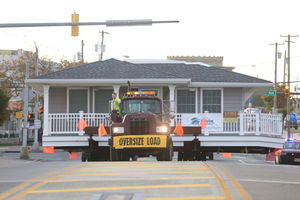Prospective purchasers of real estate, and many owners, sometimes ask whether they need a survey.…

Why Isn’t That Easement On My Survey?
Real estate investors, developers, and even residential property owners who want to know specifically what they are buying or what they already own will often commission a survey. The survey will establish with precision the property lines and locate any structures on the property.
And it will also locate any easements which impact the property, such as utility easements and rights of way—or will it?
The short answer is: in theory, yes; in practice, often, but not necessarily always!
A Word About Surveys.
While most home buyers never seek a survey as a part of their due diligence in purchasing their property, surveys are common in commercial acquisitions and in purchases of land for development, including for residential purposes. And when a lot is being purchased for construction of even a single residence, it is often prudent to seek a survey, and one may in fact be necessary for purposes of permitting or even to meet financing requirements.
Land surveys in Rhode Island are governed by Procedural and Technical Standards prepared by the Rhode Island Society of Professional Land Surveyors and adopted by the Rhode Island Board of Registration for Professional Land Surveyors. (See Standards.)
Those standards set forth the classifications and standards for various types of surveys, from Class I, High Accuracy Survey, to Class V, Control Surveys, with Class I surveys held to the highest dimensional standards of accuracy.
The procedures for each class of survey require the surveyor to review the land evidence records and title documents and to locate on the survey plan easements they find there which impact the property.
A Word About Easements
There are good reasons to be concerned about easements. A lot purchased for development may be impacted by easements which limit development on the lot or even make it undevelopable. For example, if significant underground easements run through the proposed development envelope on the site, the only alternatives may be to relocate the easements or forgo building. And the holder of the easement may prohibit relocation, or the cost of relocation may make the development unfeasible.
Similarly, if others have the right to access the property under an easement, as for example, access to the ocean or another parcel of real estate, those rights may prevent construction of any structures in the easement area.
In order to understand the impact of an easement on the property, in most instances you must be able to locate the easement on a plan of the property.
The Question
Now enter the surveyor and his survey plan. If the survey plan does not show any easements on the property, can you be confident those easements do not exist. “Of course”? or “Not Really”?
Experience has taught me that surveyors are very good at finding easements on their review of land evidence records, at least easements that are labeled easements. Surveyors are also familiar with the various forms of easements recorded against properties in the land evidence records by various utilities over the years. (It is not uncommon to find easements encumbering properties that were recorded over a hundred years ago.)
The Caution
But here is the caution for real estate buyers, investors, and developers. Sometimes easements are very difficult to find in the land evidence records. Sometimes they are literally almost hidden; buried deep within deeds, leases, or other documents pertaining to a parcel of real estate. These illusive easements may be from the days when deeds and other instruments of conveyance were handwritten, and sometimes the penmanship was none too good, making them even harder to find! The easement may be a two or three line reservation or grant in an otherwise long and rambling document.
The simple fact is that surveyors are human, and they sometimes miss these easements.
So what is a property purchaser to do if he wants to be comfortable no easements impact the property he is acquiring?
Practice Tip
Let the surveyor do his work, but at the same time commission a very good title company to do a report of the title to the property. If you are buying the property you will need this title report for title insurance, which any lender will require and which an owner providing cash financing should in any event get for himself even without a lender’s mandate.
Before you accept the survey, review it with the title report and ensure that all easements and restrictions noted in the title report are reflected on the survey. Skilled title examiners are used to unearthing even difficult to find easements. This is a check on the surveyor, and if the title examiner finds something the surveyor misses, the information can be provided to the surveyor for a revision to the plan. Conversely, if the surveyor finds something the title examiner misses, you are also protected.
This happens more often than one may think. For example, just last month I was involved in a purchase transaction where the surveyor understandably missed a buried easement, the title company found it, and when plotted the easement did not adversely impact the property.
And hopefully, all will live happily ever after!


